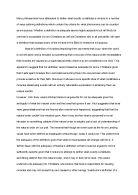Aquinas then elaborated on this idea moving it into the realm of Christian morality. He posited that natural ethics was not only learned from observation of the natural because it seemed that the cravings of the body, which were by all means natural, were not all moral. As such he thought that in order to discover what is good we must use observation in combination with excellent reason. He used the caveat excellent because he believed that reason could be corrupted by the trials of human existence. With his excellent reason he induced that the moral laws could be broken down into four precepts (in order of precedence);
- Eternal law – The mind of God
- Divine law – Our perception of the mind of God (the bible)
- Natural law – Derived from observation of the way things “should” be and reason.
- Human law – The laws created by the current earthly authority.
As shown Aquinas held Eternal law and Divine law in higher regard than Natural. This was however only because natural law is known by human observation and rational which is imperfect in relation to the mind of God. Although fully comprehended natural law has the same level of importance because it should reflect the will of God as he himself created it. This also solves the Euthypro dilemma because our moral inclinations are objective and also natural. As such God could not do anything arbitrarily in conflict with those moral inclinations because the natural is a reflection of him.
An important aspect of natural law is that of exterior and interior motive. This means that an action must only be in itself moral (E.G. Charity) but the intent must also be moral (E.G. Altruism).
For example lying to protect someone’s feeling is a good interior act because of the good intent but a bad exterior act because part of the nature of man is to know truth and obstructing this is unnatural.
The system is far from perfect though, for example it relies very heavily on the existence of God. If this is not accepted as a premise then the idea begins to break down. If the nature of things was not created by a God who is inherently good then nature does not necessarily reflect what is moral. In fact if we accept an atheistic point of view (combined with modern scientific discoveries) then it would seem that the nature of things around us is a product if random chance and as such bears no relevance to ethical thinking.
Another potentially flawed assumption is that human reasoning is correct when “uncorrupted” if the reason of mankind is simply a survival tool developed in our species by process of natural selection then it may not be adequate to answer any philosophical question less so those of ethics (though this very argument uses human reason). Assuming that human reason can be correct who is to say how to calibrate it? How can we know if one is reasoning excellently if we have no standard to compare it to? Aquinas answers this by saying that we can compare it to the reason of God as he is the ultimate rationality but this again relies on the assumption that such as god exists.
As hinted previously not only does most of natural law rely on the premise of the existence of God it also relies on very specific attributes which that God must have.
This God must;
- Be good
- Have created nature
- Sustain of nature
These assumptions are fairly demanding and will, I believe, need to be tacked further before Natural Law can hold as much weight as it deserves as an appealing logically consistent theory. It is important to note however that if this argument is considered in the context of faith. as opposed to a secular framework, that these assumptions become substantially more reasonable or even necessary.







